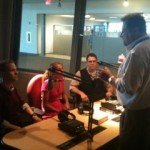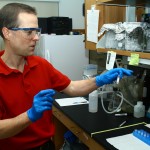Campus Life Editor
with reporting by
SHIRA KIPNEES ’15
Staff Writer
[divider]
Robert Jinks, associate professor of biology, and the students involved in his lab have collaborated on a project to help the Mennonite and Amish communities in Lancaster County at the Clinic for Special Children, which works to blend clinical and research-based medical care into one organization. The Clinic assigns mutations that cause genetic diseases, and the lab clones the genes, expresses them in cells, and performs functional studies on them to determine how the mutations cause the disorders.
Jinks formed this connection with the Clinic in the fall of 2010. That year, groups of students in Jinks’ Neurochemistry course were assigned genes to study throughout the course of the semester. The students had to research the primary literature as much as they could and then design experiments to learn more about the genes and the changes that occur with the mutations. Students also had the opportunity to present their findings to members of the Clinic, and one student was able to meet some of the families of the patients.
Genetic diseases are prevalent among the Amish and Mennonite communities due to the founder effect, which is when a small subset of a population relocates, creating a new gene pool that is different from that of the original population. The altered gene pool persists and even worsens because the Amish and Mennonite rarely marry outside of their own communities. This does not allow for the genetic variation present in a large, diverse population.
This collaboration has been highly successful, and the team has received much notoriety, especially this semester. In January, an article entitled “Genetic Mapping and Exome Sequencing Identify Variants Associated with Five Novel Diseases,” which was coauthored by several current students, was published in PLoS ONE, a science journal published by the Public Library of Science.
Recently, the team was also mentioned in Nature, a prestigious, international scientific journal. The article, “Rare diseases: Genomics, plain and simple,” focused on the Clinic and its advances in personalized medicine in a clinical setting, which have been saving the patients’ families much money.
Becky Willert ’12, one of Jinks’ independent research students, also appeared on the radio with Jinks and Kevin Strauss, medical director at the Clinic for Special Children, in recent weeks. The three gave an interview about the collaboration on the program Radio Smart Talk on WITF, a radio station serving Central Pennsylvania.
“I already have had a few students come into lab because they heard about the work we do and came to F&M because of this,” Jinks said. “They wanted to work with these projects, which is great.”
“Students can talk to patients and the families of patients with these diseases,” Jinks added. “It is also an opportunity for them to interact with another culture right in our backyard and explain their learning and findings in clear, concise terms. This creates great opportunities across liberal arts and is in many ways, community based learning.”
A few seniors also weighed in on how valuable the experience working with this lab has been.
“I began working with Rob during the fall of 2010, when I enrolled in his Neurochemistry course,” said Nate Achilly ’12. “I enjoyed my project so much that I’ve continued working with him as an independent study student. It’s been great. This unique opportunity is something I brag about to my friends back home. It’s the sort of experience that profoundly impacts one’s life.”
“Most undergraduate institutions aren’t doing this type of work,” Fiorentini said. “This investigation isn’t just exciting because it’s all new; it’s also remarkably meaningful. We know that the work we are doing here will one day make a great impact on the people of the Plain communities.”
“As we carry on to future careers, the experience and knowledge that we gained here in this lab will help us no matter what we do in life,” Willert said.
[divider]
alanna.koehler@fandm.edu
shira.kipnees@fandm.edu



